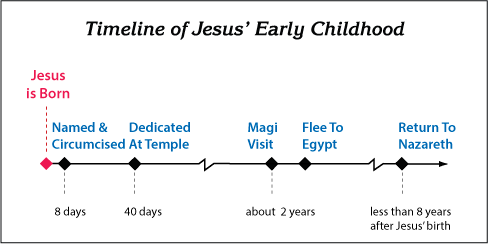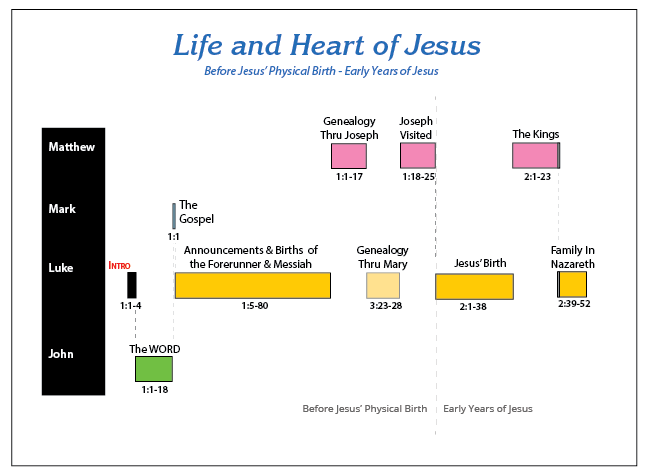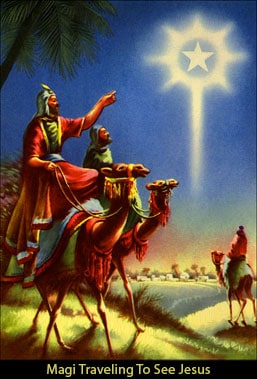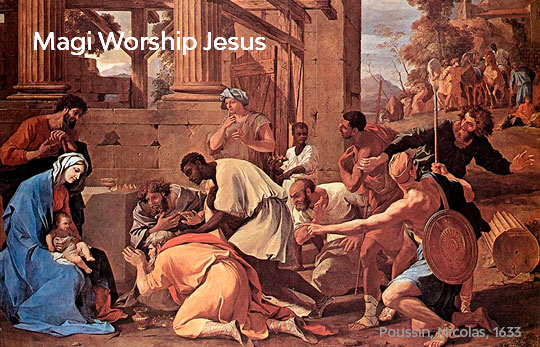The events surrounding Jesus’ birth in the gospels of Luke and Matthew are very different. The gospel of Luke tells us about the angel Gabriel’s visit to Mary, the trip of Mary and Joseph to Bethlehem, Jesus’ birth in Bethlehem, the shepherds’ visit to see Jesus, and the blessings given by Simeon and Anna in the Temple in Jerusalem. Matthew ignores those details but adds new ones such as Gabriel’s visit to Joseph, the arrival of the magi, the trip of Joseph and Mary to Egypt and back, and their trip up to Nazareth. Why are the accounts different? Luke and Matthew have different purposes. Luke wants us to know that Jesus was God in human flesh, but Matthew wants us to know that Jesus is the Messiah, and so Matthew includes fulfilled prophecy. Both Luke and Matthew want us to know that Jesus came to die for us. In our last study we saw God’s love and mercy toward the shepherds, Simeon, Anna, and Mary. Forty days had passed since Jesus’ birth. In this study, we see God satisfying the heart’s desire of some important men from the east. These men have come to seek the One referred to in ancient prophecies. They have come to see a baby.

The Magi Arrive
Jesus was born during the reign of Herod the Great (35 B.C. to 1 B.C) in Judea and while Quirinius was governor in Syria (3-2 B.C. and A.D. 6-9).
Now after Jesus was born in Bethlehem of Judea in the days of Herod the king, magi from the east arrived in Jerusalem, saying, “Where is He who has been born King of the Jews? For we saw His star in the east and have come to worship Him.” Matthew 2:1-2 (NASB)
But before Herod died, some magi arrived in Jerusalem from an eastern country. The weight of historical testimony indicates that the magi came from the ancient Parthian Empire (old Persia). History indicates that the Roman and Parthian empires were once at war as early as 55 B.C. Tension between the two empires continued into the early childhood of Jesus. The Parthian Empire was east of the Roman Empire. The border between the two empires appears to have been along the Euphrates River which currently is in the country of Iraq and of southern Turkey. The Parthian religion was called Aura Mazda, and the priests of the religion were called “Magi.” They were known for their magic and astrology.

When Matthew says that “magi from the east arrived,” it appears that he is referring to the “Magi” of the Aura Mazda religion. The magi would have been significant individuals. They would not have travelled by themselves into the territory of the Roman Empire since they were not exactly friends. Therefore, it is doubtful that they travelled by themselves. In fact, they probably travelled in a caravan bringing along their food, clothes, and maybe some women. Since they were in semi-friendly territory, they probably also had some soldiers with them for protection from either robbers or Roman soldiers. So it should not be surprising that Herod and the citizens of Jerusalem were troubled when they arrived. It is also doubtful that only three magi came. Three magi, with three gifts, riding on three camels would not upset a king guarded by Roman soldiers and a city full of people. No, they came in force. There were probably many magi.
When Herod the king heard this, he was troubled, and all Jerusalem with him. Matthew 2:3 (NASB)
How did they learn about the birth of the Messiah? The answer is found in the prophecy of Daniel 9:25-27 where the time of the Messiah’s death is predicted. Since a person’s birth precedes their death, the magi would have known that his birth was near. It is important to remember that the prophet Daniel had been deported from Canaan to Babylon by Nebuchadnezzar. Since the Parthian Empire overlapped the ancient territory occupied by the Babylonian Empire, it is not a mystery as to how they would have known about the prophecy because of Daniel’s prominence in Babylon. His teachings would have been well known.
They came looking for the One who was born King of the Jews! They had seen His star in the east, and so they came looking for Him. But why did God provide the star?
Herod’s Inquiry
Herod was disturbed. So he decided to find out if such a person had been born – not so much for them, but so that he could kill the child.
Gathering together all the chief priests and scribes of the people, he inquired of them where the Messiah was to be born. They said to him, “In Bethlehem of Judea; for this is what has been written by the prophet: “AND YOU, BETHLEHEM, LAND OF JUDAH, ARE BY NO MEANS LEAST AMONG THE LEADERS OF JUDAH; FOR OUT OF YOU SHALL COME FORTH A RULER WHO WILL SHEPHERD MY PEOPLE ISRAEL.” Matthew 2:4-6 (NASB)
Where was the King of the Jews or the Messiah to be born? He was to be born in Bethlehem according to the prophecy in Micah 5:2. It was a town about five miles south of Jerusalem.
The theme of the gospel of Matthew is that Jesus was and is the Messiah. He has already repeated this theme in Matthew 1:1 and Matthew 1:23. He will do it again. God’s message is clear: Jesus is the Messiah, the King of the Jews.
The Silver Tongue
Herod was a crafty individual with a silver tongue. This type of person is common in every business, government, and church. He or she is someone who is sweet and polite but decaying on the inside. Now that Herod had discovered where the child was to be born, he set the trap.

Then Herod secretly called the magi and determined from them the exact time the star appeared. And he sent them to Bethlehem and said, “Go and search carefully for the Child; and when you have found Him, report to me, so that I too may come and worship Him.” Matthew 2:7-8 (NASB)
Herod did not plan to worship anybody. He planned to kill the child. He was a liar with a silver tongue.
The Star
So the magi left Jerusalem for Bethlehem to find the King of the Jews.
After hearing the king, they went their way; and the star, which they had seen in the east, went on before them until it came and stood over the place where the Child was. When they saw the star, they rejoiced exceedingly with great joy. Matthew 2:9-10 (NASB)
There are a number of non-scientific and non-biblical views people have about this star. Some believe that the star was a great nova which was recorded in the Chinese records in 5 B.C. Others believe that the star was Halley’s Comet on 12 B.C., and many believe that it was the junction of Jupiter, Saturn, and the sign of Pisces of 7 B.C. Others contend that Jupiter was the star, and that it stood still over Bethlehem.
But there are several major problems with all of the astronomical solutions. First stars do not appear, disappear, and then re-appear. Matthew 2:16 tells us that the star had appeared in the east two years before Jesus was born. Matthew 2:9-10 strongly suggests that the star disappeared. Why would the magi be glad when they saw the star if it was always present? In fact, why would the magi stop at Jerusalem to ask where the King of the Jews was to be born? The answer appears to be that the star disappeared, and so they stopped by to obtain the information. God apparently caused the star to disappear so that Herod would be motivated to fulfill prophecy in Matthew 2:16-18.
Second, stars do not stop and stand over a fixed location on our earth. Since the earth rotates on its axis, a star would also need to rotate with the earth in order to remain fixed over Bethlehem. That is not possible.
No, the star cannot be explained by astronomy. The star was simply a miracle of God. It was God’s map to guide the magi to Jesus. God cared about these eastern magi.
The Magi And Jesus
The Holy Spirit says that the star “stood over the place where the Child was.” That is, it stood over the house in which Joseph, Mary, and Jesus were living.
After coming into the house they saw the Child with Mary His mother; and they fell to the ground and worshiped Him. Then, opening their treasures, they presented to Him gifts of gold, frankincense, and myrrh. Matthew 2:11 (NASB)

Notice that Joseph and his family were now living in a house. Why did they remain and live in a house? Why didn’t they return to Nazareth? The answer is probably found in the fact that it would have been best for Mary and Jesus not to make the long trip back to Nazareth immediately. Since Joseph needed to get his family out of the cave with the manger, he moved them to a house. He probably started working locally to support his wife and new baby. As with most of us, time slips away, and two years later the magi arrive.
What an amazing event. A group of eastern priests or magi came and worshipped the King of the Jews. They offered gifts of gold, frankincense, and myrrh. There may have been more than three gifts. If many magi were present, then many gifts could have been offered. All of which were either gold, frankincense, or myrrh. The magi did not come to simply give gifts. They came to see and worship the promised Jewish King.
Happy Magi
The magi must have been rejoicing. Their long journey had not been in vain. They had traveled months to see the promised One; and they had seen Him, worshipped Him, and honored Him with gifts. They must have enjoyed their evening meal and spiced it with words about Jesus and maybe they gave thanks to God for the re-appearance of the star.
When they went to bed, wonderful thoughts must have flowed through their heads. They came looking for a different kind of treasure, and they found it. They had not expected that God would now speak to them directly in a dream, but He did. Now He will do it again. Would you have enjoyed being one of them?
And having been warned by God in a dream not to return to Herod, the magi left for their own country by another way. Matthew 2:12 (NASB)
God was speaking to them in a miraculous way. What did they think? Did they feel special? The message was simple. They were not to return to Herod. They obeyed. Why would these non-believers obey? Why would they believe their dream? Most of us might ignore such a dream. We will never know the answer to our question in this life.

Conclusion
But why did God provide the star? The obvious fact is that God provided the star and provided it for these magi. But why? It is easy to assume that these magi were believers. But God has answered the hopes and wishes of non-believers before, such as Nebuchadnezzar (Daniel 2). So why provide the star? The magi wanted to see the King of the Jews. But there are lots of things non-believers want to see and do, and God has not always helped them.
The answer has two parts. God used the desire of these magi to demonstrate that the Old Testament prophecies about the Messiah were clear. The Messiah was to be born about that time, and He was to be born in Bethlehem. If ancient magi could read the Old Testament scriptures and understand when the Messiah was to born, then we should too! The Messiah was born in 1 B.C. and He was to die in A.D. 33.
Second, God demonstrated His love for these men. He did not need to provide the star at all. Their visit to Jerusalem would have given them enough information to complete their trip. The re-appearance of the star was a gift from God to these men. God satisfied the longing of their hearts to see the King of the Jews – Jesus Christ. God gives gifts. He gives great ones. Did they become believers? They finally understood who God was, and they realized that He cared about them. This truly was a great Christmas for them. I think they believed in God and became believers. I think they knew that the baby was to be the Savior of the world. Are you a Christian?